Funded Projects (Old Content)
I am (or have been) the Coordinator or the Principal Investigator of the following projects:
COMnPLAY SCIENCE |
|
 |
The COMnPLAY SCIENCE project aims to help Europe better understand the new ways in which informal science learning is taking place through various coding, making, and play activities that young Europeans (children, adolescents and young adults) are nowadays increasingly engaged with, outside school and higher education science classrooms, beyond the formal boundaries of science education. For more information about this project, visit the official page. Funding scheme: H2020. Start: June 2018, End: May 2021 |
Envisage – Enhance virtual learning spaces using applied gaming in education |
|
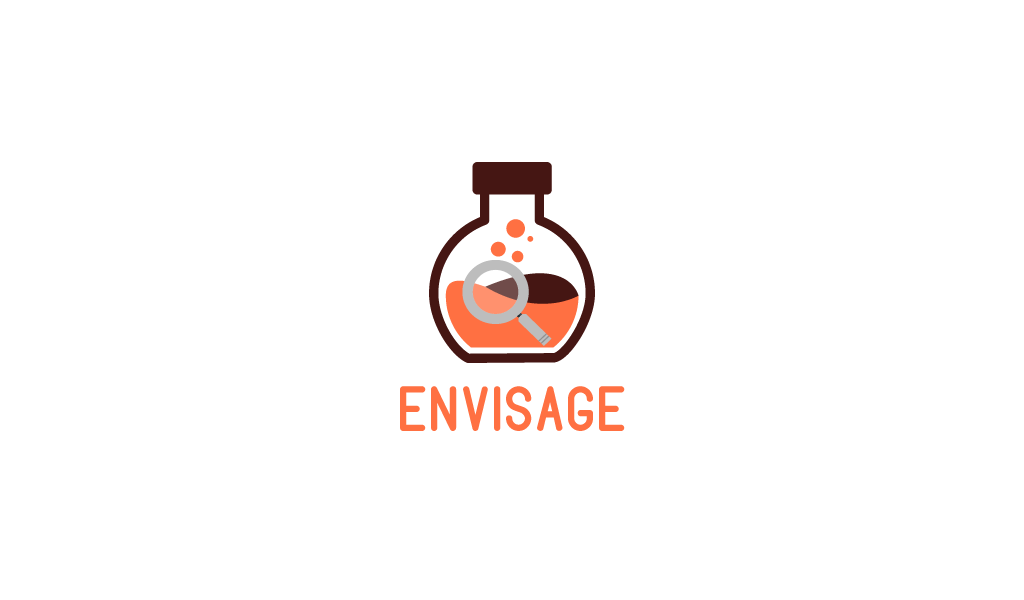 |
ENVISAGE proposes to transfer technology from the domain of digital games for the benefit of education and learning. Game Analytics is used to profile users, predict their behavior, provide insights into the design of games and adapt games to users. These mature technologies can be readily migrated to learning analytics. In particular, ENVISAGE follows a data-driven approach to solve the problems of designing, adapting, revising and evolving virtual labs. To that end, the project will develop a high-level, easy to use, authoring environment that integrates the above methodological paradigms allowing for designing and implementing high-standard virtual labs. For more information about this project, visit the official page. Funding scheme: H2020 ICT. Start: October 2016, End: September 2018 |
eCrisis – Europe in Crisis |
|
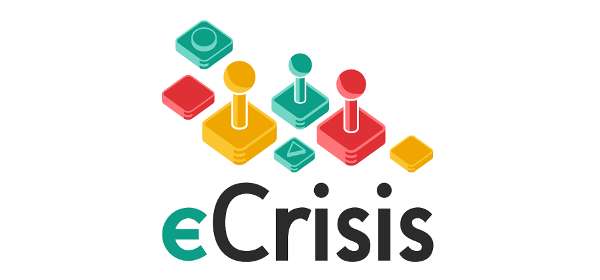 |
The last decade of European history has been characterised by serious societal challenges and conflicts which occur as emergent by-products of economic recession, social structure instabilities, and most recently, the refugee crisis. An increasing number of citizens in Europe are still nowadays culturally, socially, and educationally excluded. The vision of a healthy and stable socioeconomic structure which brings together people from diverse ethnical backgrounds, societal values, religions and cultures under a European umbrella of societal justice, inclusion and rapid integration is threatened by the current situation. The 3-year eCrisis project aims to enable inclusive education through playful and game-based learning and, thereby, foster the development of social, civic and intercultural competences such as conflict resolution, creative thinking, and reflective debate in primary and secondary education students. For more information about this project, visit the official page. Funding scheme: Erasmus+. Start: September 2016, End: August 2019 |
CrossCult – Empowering reuse of digital cultural heritage in context-aware crosscuts of European history |
|
 |
The European project CrossCult (Empowering reuse of digital cultural heritage in context-aware crosscuts of European history) aims to spur a change in the way European citizens appraise history. It will foster the re-interpretation of what citizens may have learnt in the light of cross-border interconnections among pieces of cultural heritage, other citizens’ viewpoints and physical venues. It seeks to increase retention, stimulate reflection and help citizens appreciate their common past and present in a more holistic manner. Technology and mobile apps will be used and a user-friendly and a cost-efficient tool for experience designers, museum experts and external stakeholders, will be developed. For more information about this project, visit the official page. Funding scheme: H2020 Reflective. Start: March 2016, End: February 2019 |
AutoGameDesign – Autonomous Computational Game Creators |
|
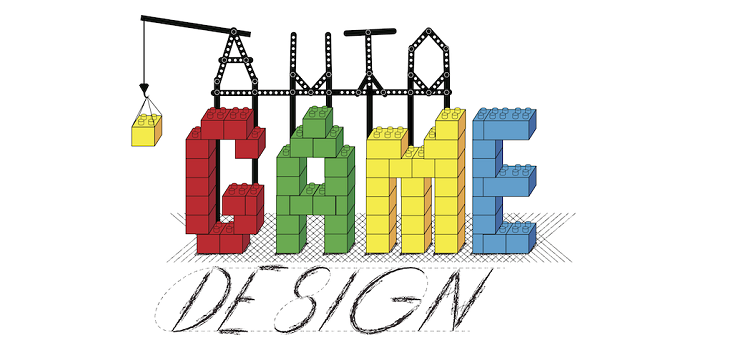 |
The project aims to answer the question of whether autonomous creative systems are able to generate valuable, novel and surprising outcomes within games, thereby realising computational game creativity. It explores how computational creators can be equipped with transformed exploratory creativity for the generation of novel and valuable outputs and how surprise can be modelled computationally and drive the search for and evaluate creativity. Advanced machine learning methods are fused with computational predictors of emotive creativity yielding entirely new ways of searching within the creative search space. The computational creators’ output is evaluated within the domain of game design being among the most content-intensive and multifaceted domains of human creativity and, undoubtedly, the richest form of human-computer interaction. The project is built upon world-class expertise in computational creativity, artificial and computational intelligence, machine learning, affective computing and advanced game technology, ensuring the development of autonomous computational creators that will advance the measurable capability of computers to produce results that are self-assessed, and assessed by humans, as useful, original and surprising. For more information about this project, visit the official page. Funding scheme: FP7 Marie Curie CIG. Start: March 2014, End: February 2018 |
C2Learn – Creative Emotional Reasoning Computational Tools Fostering Co-Creativity in Learning Processes |
|
 |
The C2Learn project sets out to shed new light on, and propose and test concrete ways in which our current understanding of creativity in education and creative thinking, on the one hand, and technology-enhanced learning tools and digital games, on the other hand, can be fruitfully combined to provide young learners and their teachers with innovative opportunities for creative learning. The aim of the C2Learn project is to design an innovative digital gaming and social networking environment incorporating diverse computational tools, the use of which can foster co-creativity in learning processes in the context of both formal and informal educational settings. We envision this innovative C2Learn environment as an open-world “sandbox’’ (non-linear) virtual space enabling learners to freely explore ideas, concepts, and the ‘shared’ knowledge available on the semantic web and the communities that they are part of. For more information about this project, visit the official page. Funding scheme: FP7-ICT. Start: November 2012, End: October 2015 |
ILearnRW – Integrated Intelligent Learning Environment for Reading and Writing |
|
 |
The aim of the ILearnRW project is to contribute towards a move away from traditional assistive software which uses a computer simply as an alternative to pen and paper and towards developing next generation learning software which uses a computer system to facilitate the learning process for children with dyslexia and/or dysorthographia. Towards this end, we will develop an Integrated Intelligent Learning Environment for Reading and Writing demonstrating for the following features: 1. User modeling (a profile is built for each learner); 2. Personalized content presentation (the type of dyslexia of the specific user influences the text presentation process); 3. Engaging learning activities (integrate learning activities into serious games where the game scenarios and interaction mechanisms will depend on the learners profile, the learning strategy adopted and the student’s performance). For more information about this project, visit the official page. Funding scheme: FP7-ICT. Start: October 2012, End: September 2015 |
Games for Health |
|
| The Games for Health project attempts to combine technologies and concepts from computer games and persuasive game design in health. The project’s area is mental health, focusing on screening, diagnosing and treating soldiers with Post Traumatic Stress Disorder (PTSD). We aim to develop an exposure therapy game which will feature advanced user profiling/modeling for detecting stress in PTSD patients via their physiological signals and adapt game elements to personalise the treatment of PTSD. For more information about this project, visit the official page. Funding scheme: RTI (DK). Start: September 2010, End: August 2012 | |
SIREN – Social games for conflIct REsolution based on natural iNteraction |
|
 |
Improving conflict resolution skills among the population at large is of paramount importance for a healthier, more peaceful and productive European society. These skills are best taught in early years, using teaching tools that are appropriate and engaging for today’s children, for whom computer games and social networks are natural parts of life. The SIREN project aims to create a new type of educational game, the conflict resolution game, which takes advantage of recent advances in serious games, social networks, computational intelligence and emotional modelling to create uniquely motivating and educating games that can help shape how children think about and handle conflict. The software developed by the project will be able to automatically generate conflict scenarios that fit the teaching needs of particular groups of children with varying cultural background, maturity, and technical expertise, and the desired learning outcomes as specified by a teacher. For more information about this project, visit the official page. Funding scheme: FP7-ICT-2009-5. Start: September 2010, End: August 2013 |
AGameComIn – Adaptive Game Content using Computational Intelligence |
|
 |
The principal goal of the AGameComIn project is to enhance the experience of computer game-players by developing computational intelligence algorithms that learn mappings between game features and player satisfaction, and the use of computational models as evaluation functions for game content such as rules and environments. For more information about this project, visit the official page. Funding scheme: FTP (DK). Start: September 2009, End: August 2012 |
CEPEG – Capturing and Enhancing Player Entertainment in Games |
|
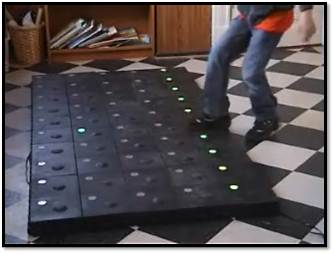 |
The research goals of this project are to model in real time computer game players/users satisfaction and strategies for commercial games using information available from the game platform, and to construct software able to do this. To achieve these goals we devise a method that efficiently identifies qualitative features contributing to player satisfaction; design quantitative measures for these features; investigate the correlation between the type of player, the real-time satisfaction estimation and the quantitative feature values and develop and implement AI techniques based on user modelling and machine learning that will augment the entertainment value of the game in real-time. For more information about this project, visit this page. Funding scheme: FTP (DK). Start: January 2006, End: December 2007 |
I am (or have been) a Partner/Collaborator/Research Associate in the following projects:
FORETELL – Flood and Fire Safety Awareness in Virtual Worlds |
|
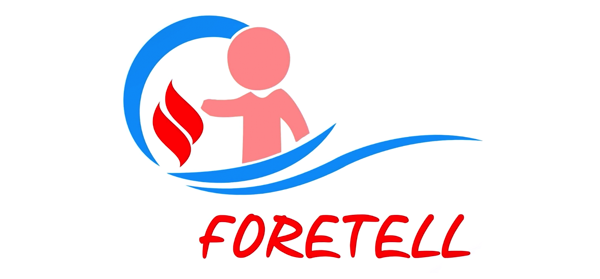 |
The FORETELL project emerges from the need to promote a culture of safety in Europe against natural calamities, such as floods and fires. The FORETELL project aims to prepare children to cope with these environmental hazards, through experiential learning activities (e.g. task-driven simulations or/and educational games etc.) which will be designed based on scenarios of “good practices” regarding these hazards and implemented in a 3D virtual world. Upon completion, the project will provide an on-line learning tool that is particularly effective, pervasive and suitable for the target population and the general public. Furthermore, FORETELL aims to empower the profile of the teaching professions in order to adopt novel approaches in teaching and assist the teachers of Natural Sciences providing them with open digital educational material which will be developed in the context of the project. For more information about this project, visit the official page. Funding scheme: Erasmus+ KA2. Start: December 2015, End: November 2016 |
RIDERS – Research in Interactive Drama Environments, Role-Play and Storytelling |
|
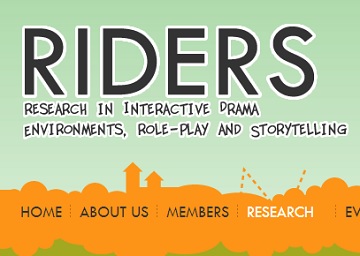 |
The RIDERS network brings together researchers from a variety of disciplines and thus has the potential for many new collaborative projects. While the investigators have relevant expertise in interactive digital storytelling and AI planning for synthetic actors, the fields of human-computer interaction, interactive digital media, psychology, affective computing, performance Arts, narratology, creativity, and public engagement with science and gaming are also relevant. For more information about this project, visit the official page. Funding scheme: EPSRC (UK). Start: September 2011, End: September 2014 |
Playware |
|
 |
The aim of the “playware” research is to develop products that use IT to create play equipment and play environments that can stimulate children and youth to engage in physical, social play and playful learning. In particular, the aim is to identify and explore the possibilities afforded by mobile and ambient intelligence computing for developing new play environments. The play environments invite physical activating play to become an important factor in the community’s fight against an increasing child obesity problem. For more information about this project, visit this page. |
EURON Network |
|
 |
EURON is a community of people with a common interest: robots. It brings together the best European robotics groups and resources in research, industry and education. EURON aims to demonstrate Europe’s world class position in robotics. For more information about this project, visit the official page. Funding scheme: European Commission. Start: 2001, End: 2008 |
PLANET Network |
|
| PLANET is the European coordinating organisation for research and development in the field of AI Planning and Scheduling. It aims to stimulate innovative research and development and to promote the industrial uptake of the technology. PLANET supports activities that foster progress in research and development. It promotes the exchange and collaboration between academic and industrial sites through training and technology transfer activities. It maintains a supporting information and communication infrastructure and represents a comprehensive source of technological expertise. For more information about this project, visit the official page. Funding scheme: FP5-IST. Start: 1998. | |
